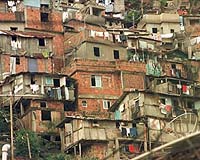
Natural disasters will continue affecting the world’s poorest people until decision makers address factors including rapid urbanisation and environmental destruction, a conference heard Thursday.
European parliamentiarian Anders Wijkman told an international convention on disaster prevention while the global proportion of people living in poverty had fallen in recent decades, they continued to live in risk-prone areas.
The earth’s population had doubled in the past 40 years while people living in urban areas had increased five-fold, a trend that was continuing, Wijkam said.
Decision makers, from politicians to policy-makers to members of humanitarian organisations, needed to be made aware that most disasters are rooted in development failures, he added.
“The separation of development activities from humanitarian operations have to be reconsidered,” Wijkman said. “Risk reduction must be seen as a development concern and not, which is the case today, as primarily a humanitarian concern.”
After so many disasters, there’s always the talking head in front of a camera saying, “this was an accident waiting to happen.” What this conference concluded is that — why not try to prevent some of these disasters? If nothing else, it’s less costly.















It’s the developed countries that get less of the disaster cost. Even Katrina had a relatively small deatyh toll.
I haven’t been in Sausalito for a few years – it has really become run down. What a crap-hole!
Trade and transport has always dictated city locations. That’s where the jobs are. Civilization is always about economics. Usually the economy has to change first, then the people follow. Doesn’t do any good to keep you safe from natural disasters if you’re just going to starve to death. Better to drown fast than waste away.